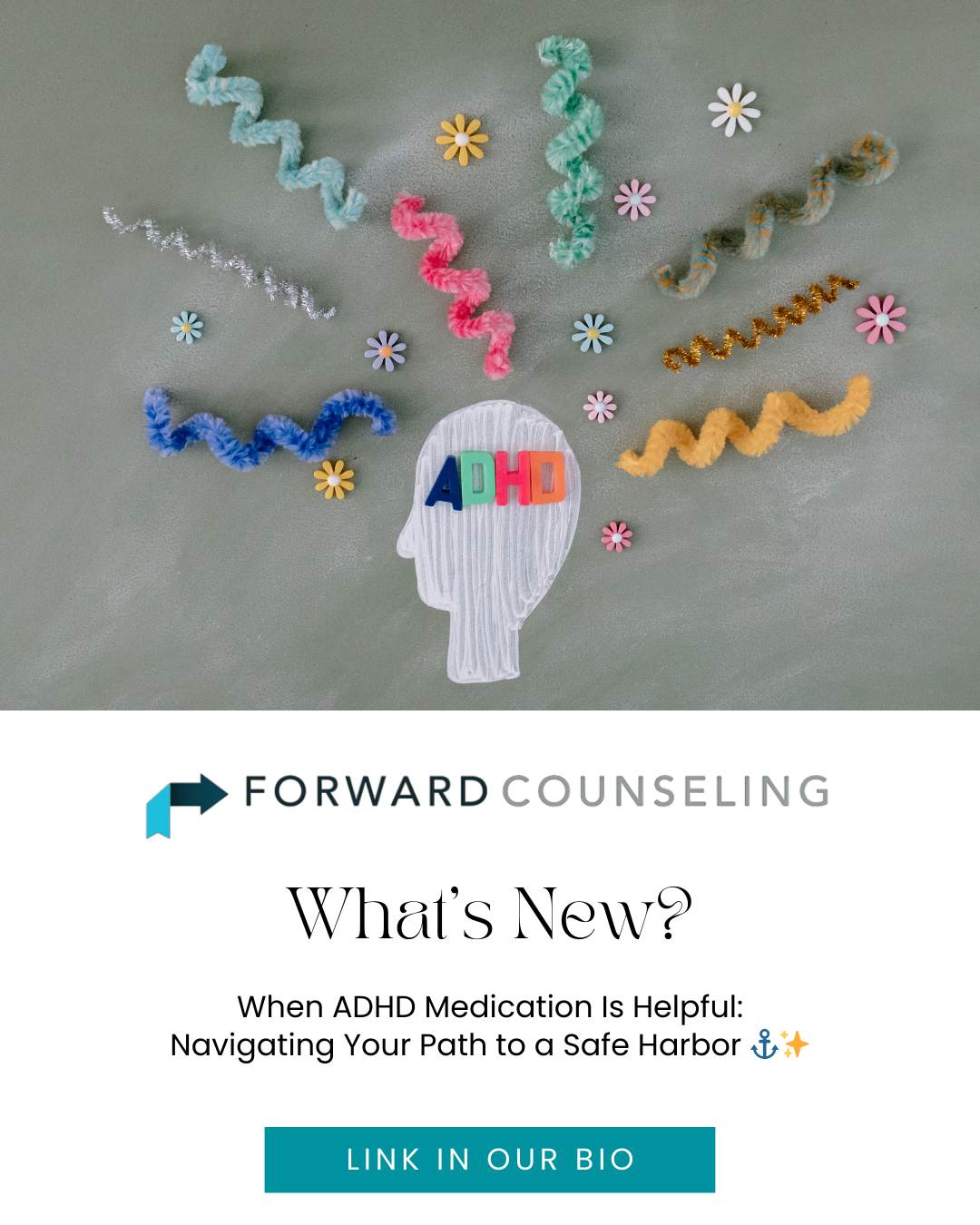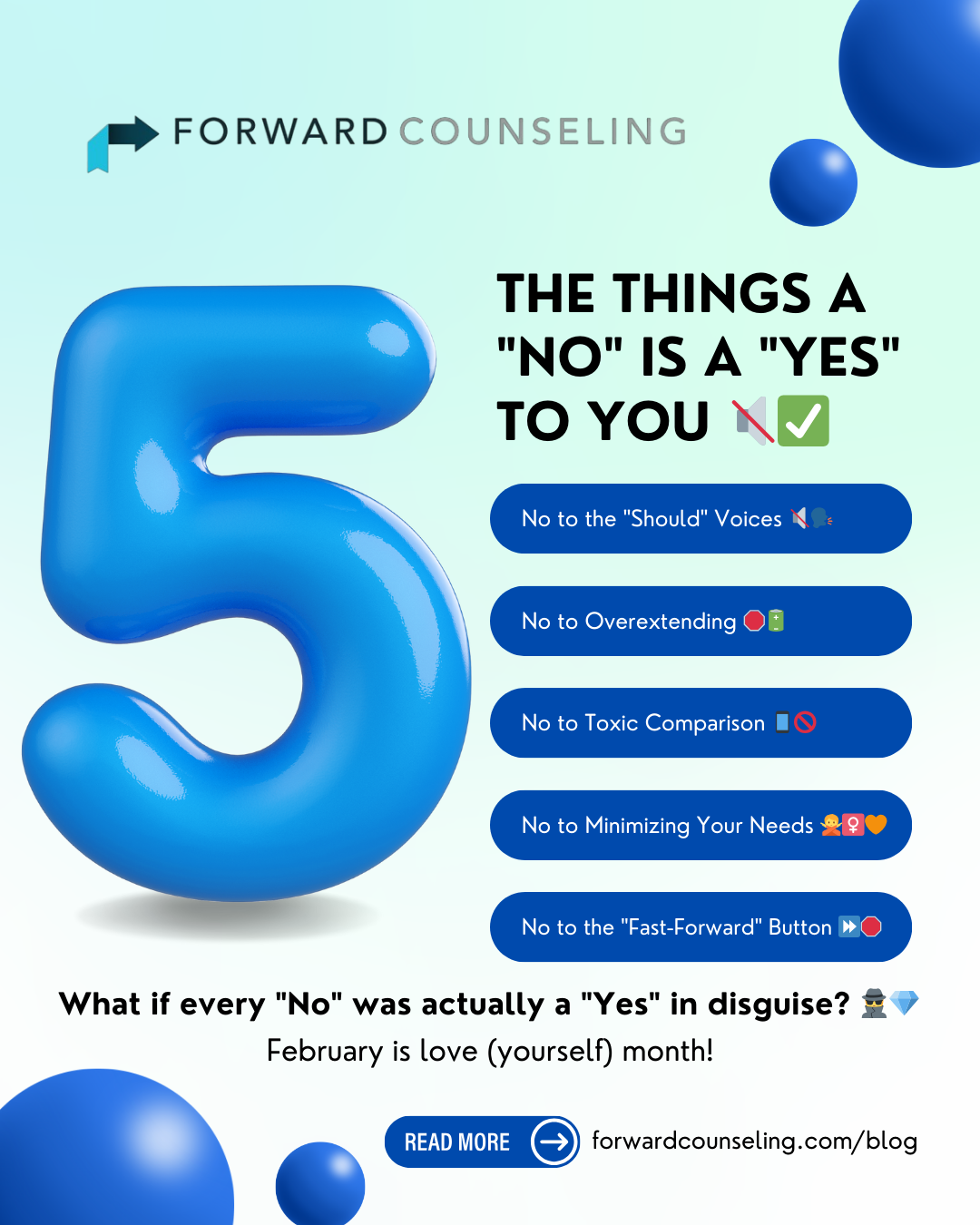Finding Your Way Back Together: Insights on Couples Counseling & Lasting Connection from Ryan Pepperman, NCC
/Strengthening your relationship through counseling is a testament to your commitment and resilience. We see couples who undergo counseling as a truly brave act, and it takes courage to look at challenges head-on and even more to invite someone else into your shared space.
At Forward Counseling, we understand that finding the right support makes all the difference.
That's why we're excited to share insights from Ryan Pepperman, NCC, a compassionate and experienced professional dedicated to helping couples rediscover their connection and strengthen their bond. In this Q&A, Ryan shares his unique perspectives on healing, addresses common questions about couples counseling and therapy to help you understand how a personalized approach can guide you and your partner toward renewed radiance and inner peace.
What are the key indicators that a couple might benefit from couples counseling? When is the "right" time to seek it?
Couples may benefit from counseling when communication becomes strained, conflict feels unresolved, emotional connection weakens, or when trust has been compromised. The "right" time is often before issues escalate. Therapy can be preventive as well as restorative it's a space to strengthen the foundation of a relationship, not just to fix what's broken.
Research consistently supports Ryan's indicators for seeking couples counseling, highlighting signs such as frequent arguments, emotional withdrawal, and general trust issues as critical red flags (Raypole, 2023b). Experts emphasize the advantage of proactive engagement, noting that delaying therapy can prolong distress; early intervention is often more effective in fortifying relationships and preventing issues from escalating into deeper problems (The Gottman Institute, n.d.-b). This preventive aspect underscores how counseling can serve to reinforce a relationship's foundation rather than solely acting as a crisis intervention (Chambers & Fisher, 2022).
What are some of the most frequent communication issues you encounter when working with couples, and how do you help them navigate these?
Common issues include defensiveness, criticism, stonewalling, and misunderstanding each other's intent. I help couples slow down their interactions, identify unhealthy patterns, and build new skills for active listening, emotional regulation, and expressing needs clearly and respectfully.
Ryan's observations on common communication challenges are directly aligned with established psychological models, particularly Dr. John Gottman's "Four Horsemen of the Apocalypse"—criticism, contempt, defensiveness, and stonewalling—which are widely recognized as detrimental patterns that erode relational health (The Gottman Institute, n.d.-a). Therapeutic interventions focus on helping couples recognize and dismantle these destructive cycles, replacing them with constructive skills such as active listening, managing emotional responses during conflict, and articulating needs effectively and respectfully (Raypole, 2023a).
How can couples counseling help partners understand each other's needs and perspectives more effectively?
Counseling provides a neutral space where each partner can feel heard without judgment. Through guided conversations and reflective exercises, couples begin to recognize the emotional logic behind each other's reactions and reframe their assumptions. This builds empathy and reduces reactivity.
A core benefit of couples counseling, as Ryan describes, is its ability to create a non-judgmental environment. This neutral ground allows partners to openly express themselves and truly listen to one another, fostering deeper understanding. By guiding conversations and using reflective techniques, therapists help couples uncover the underlying emotions driving their reactions, leading to increased empathy and a decrease in automatic, often negative, responses. This process supports the overall effectiveness of psychological interventions in improving relational dynamics (American Psychological Association, n.d.).
Beyond communication, what other common challenges (e.g., trust, intimacy, conflict resolution) do you help couples address?
I frequently work with couples on rebuilding trust after betrayal, reconnecting emotionally and physically, navigating parenting roles, and handling conflict in ways that promote growth rather than disconnection. We address both emotional wounds and practical dynamics that contribute to the cycle.
The comprehensive scope of couples counseling extends far beyond just communication to encompass foundational aspects of relational health. Therapists often guide couples through the complex process of repairing trust following betrayal, helping them re-establish safety and reliability. Furthermore, counseling addresses the vital components of intimacy, aiding partners in reconnecting on emotional and physical levels. It also provides strategies for navigating shared responsibilities, such as parenting roles, and transforming conflict from a source of division into an opportunity for mutual growth.
What are some common misconceptions or fears couples have about attending counseling, and how would you address them?
Many fear being blamed, judged, or that the therapist will "take sides." Some worry counseling means the relationship is doomed. I reassure couples that therapy is a collaborative process focused on understanding-not assigning fault-and that seeking help is a strength, not a sign of failure.
Common fears surrounding couples counseling, such as being blamed or the therapist taking sides, are often rooted in misunderstanding the therapeutic process (Thriveworks Counseling, 2024). Professional counseling aims to provide a balanced and neutral space where both partners feel heard and understood. Therapists work collaboratively with the couple, focusing on identifying underlying dynamics and fostering mutual understanding rather than assigning fault. Seeking help for relationship challenges is consistently framed as an act of strength and commitment, not an admission of failure (Raypole, 2023b).
How does your approach to couples counseling empower both individuals within the relationship?
I focus on creating a balanced environment where each partner feels equally valued. I encourage both individuals to identify and voice their own needs, recognize their role in the relationship dynamic, and build relational skills that foster mutual respect, accountability, and autonomy.
Effective couples therapy is designed not just to mend the relationship, but also to empower each individual within it. By fostering an environment where both partners feel equally valued and heard, therapists enable each person to identify and articulate their unique needs and boundaries. This balanced approach encourages self-awareness regarding one's contributions to relational dynamics, promoting the development of skills that enhance mutual respect, personal accountability, and healthy autonomy, ultimately leading to a more robust partnership.
What role do individual growth and self-awareness play in the success of couples therapy?
A relationship is the space between two people-but the health of that space often reflects each individual's self-awareness and emotional maturity. When individuals gain insight into their patterns, triggers, and emotional needs, they contribute more consciously and constructively to the relationship.
The success of couples therapy is significantly enhanced by the individual growth and self-awareness of each partner. Personal development and a deep understanding of one's own emotional landscape are fundamental to a healthy partnership (Sabatini, 2023). When individuals gain insight into their unique patterns, triggers, and emotional needs, they are better equipped to respond consciously and constructively within the relationship, fostering a more mature and resilient dynamic.
How can couples maintain the positive changes and skills learned in therapy after their sessions conclude?
We work on building sustainable practices: regular check-ins, shared rituals, and tools for conflict resolution. I encourage couples to reflect on what worked in therapy and intentionally continue those habits-often including booster sessions down the line to stay on track.
Maintaining progress after formal therapy concludes is crucial for long-term relational health. Research suggests that implementing sustainable practices, such as consistent check-ins, establishing shared rituals, and diligently applying learned conflict resolution tools, helps couples integrate new behaviors into their daily lives (Pashley, 2022). Reflecting on successful strategies from therapy and consciously continuing those habits, potentially through periodic "booster sessions," is vital for ensuring that the progress made endures and evolves (Lover, 2022).
For men specifically, what unique benefits might they find in participating in couples counseling?
Men may discover language for emotions they've long suppressed, tools for connection that aren't about "fixing" but understanding, and a space where vulnerability is seen as strength. Many experience relief in realizing they don't have to carry the relationship alone or hide their inner world.
Couples counseling offers specific and profound benefits for men, often providing a rare opportunity to explore and articulate emotions that cultural norms may have encouraged them to suppress (The Relationship Hub, n.d.). Through therapy, men can learn new tools for fostering genuine connection rooted in understanding rather than solely problem-solving. This environment allows vulnerability to be perceived as a source of strength, leading to significant relief from the burden of carrying relational responsibilities in isolation or concealing their inner experiences (Couples Counseling, n.d.).
What advice would you give to couples who are navigating significant life transitions (e.g., new parents, empty nesters, career changes) and experiencing strain on their relationship?
Transitions can trigger uncertainty and reconfigure roles. I advise couples to treat these moments as opportunities to renegotiate expectations, reaffirm shared values, and support each other's evolving identities. Leaning into open dialogue and flexibility is key during these times.
Major life transitions inherently introduce uncertainty and often necessitate a reconfiguration of roles within a partnership (Self Space Seattle, 2023). Ryan's advice to view these periods as opportunities aligns with therapeutic approaches that encourage couples to proactively renegotiate expectations, reaffirm their shared values, and actively support each other's evolving identities. Open dialogue and flexibility are highlighted as essential strategies for navigating these shifts, preventing strain from becoming entrenched conflict (Thriveworks Counseling, 2024).
When engaging in couples counseling, what are the core approaches, modalities, and techniques you utilize to help couples improve their relationship? (e.g., How do you incorporate principles from Gottman, Emotionally Focused Therapy, or other recognized models?)
I draw from evidence-based approaches like the Gottman Method (focused on communication and conflict management), Emotionally Focused Therapy (EFT) (emphasizing attachment needs and emotional responsiveness). I'm also consistently engaging in learning to continue to grow my understanding and tool box in regards to working with couples.
Ryan's practice is rooted in highly respected, evidence-based therapeutic models. The Gottman Method is renowned for its structured approach to improving communication and conflict resolution skills, helping couples counteract destructive interaction patterns (The Gottman Institute, n.d.-a). Emotionally Focused Therapy (EFT), another powerful modality, focuses on understanding and transforming negative interaction cycles by addressing underlying attachment needs and fostering deeper emotional responsiveness between partners (American Psychological Association, 2022; Psychology Tools, n.d.). These approaches provide robust frameworks for guiding couples toward lasting improvement.
References
American Psychological Association. (2022, January 26). About Emotionally Focused Therapy (EFT).
American Psychological Association. (n.d.). Recognition of Psychotherapy Effectiveness.
Chambers, C., & Fisher, K. (2022, November 9). A research-driven flowchart to approach change in couples. Frontiers in Psychology.
Couples Counseling. (n.d.). Top Benefits of Couples Counseling for a Stronger Relationship. Relationship Counseling of San Diego.
The Gottman Institute. (n.d.-a). The Four Horsemen: Criticism, Contempt, Defensiveness, and Stonewalling.
The Gottman Institute. (n.d.-b). When Is It A Good Time To Seek Counseling?. https://www.gottman.com/blog/when-is-it-a-good-time-to-seek-counseling/
Lover, R. (2022, October 3). After Couples Therapy. Psychology Today Australia.
Pashley, A. (2022, November 9). Maintain The Progress: Expert Tips For After Couples Therapy. Couples Therapy Perth.
Psychology Tools. (n.d.). Emotionally Focused Therapy (EFT) Guide.
Raypole, C. (2023a, April 20). 4 Communication Problems in Relationships & How to Fix Them. Psych Central.
Raypole, C. (2023b, June 16). When to Go to Couples Therapy: 13 Signs It’s Time. Talkspace.
Sabatini, D. (2023, June 21). The Role of Individual Growth in Marital Happiness. Psychology Today.
Self Space Seattle. (2023, June 1). Managing Life Transitions Together: A Guide for Couples.
The Relationship Hub. (n.d.). Marriage Counselling for Men: What to Expect & Why It's Worth It.
Thriveworks Counseling. (2024, May 10). Therapy for Couples: Strengthening Relationships and
Taking the first step toward couples counseling is a profound act of love for yourselves and your relationship. At Forward Counseling, with compassionate professionals like Ryan Pepperman, NCC, you'll find the support, tools, and understanding to navigate challenges and rediscover the radiance of your connection.
We are here to support you, whether you’re looking for in-person or virtual sessions.








